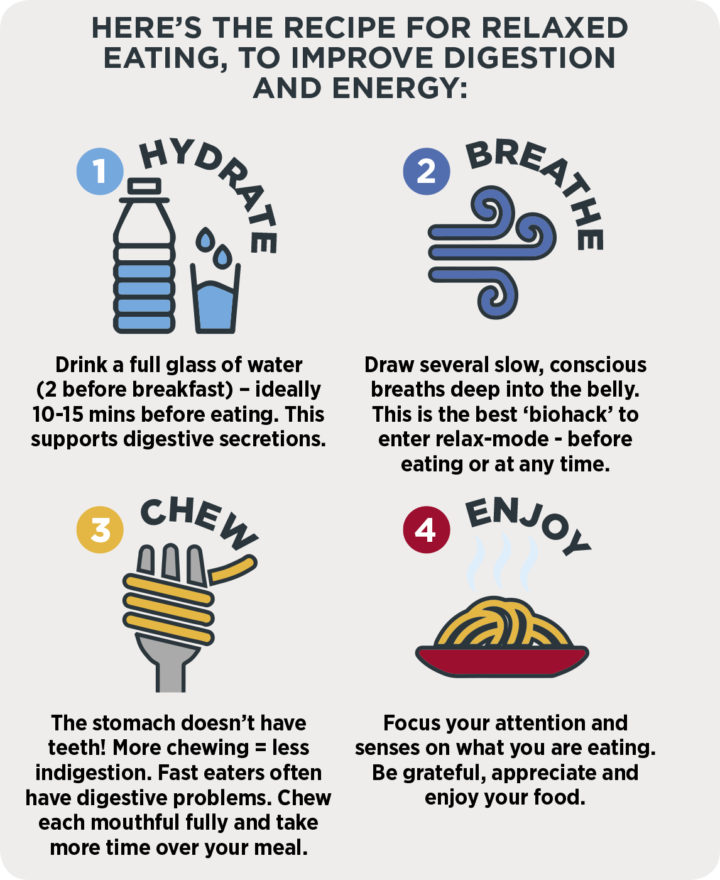Maximise Brain Function & Maintain Energy Levels

Richard Burton CEO The Irish Institute of Nutrition & Health. (IINH) shares his insights on what we need to do to stay healthy for work
Staying healthy is important for all of us, but when you work as a Contractor and daily productivity is vital to a long and successful career, it really is important to stay on top of your health. Here are Richards simple tips to help maximize your brain function and maintain consistent energy levels throughout the day.
“Some days it’s hard to be productive at work because we feel the body letting us down. Many people struggle through the day with low energy or digestive issues. The most common causes of low energy are poor dietary choices, eating habits, and unrelenting stress – often in combination”
Cut Sugar!
We’re always told that sugar provides energy. But even if we get a quick boost, the effect fades fast, leaving us drained and fatigued. We put wood on the bonfire – not petrol! Slow-release energy works best for bonfires and bodies. The brain hates spikes and troughs in blood sugar. After a sugar-rich meal levels first shoot up, then plummet – along with energy – so the brain sends you off for the next sugar fix. Welcome to the famous blood sugar rollercoaster! Many people endure this joyless ride, day after day. Protein dulls blood sugar spikes. Try switching sugar and refined carbs for protein rich foods. This stops the rollercoaster and helps optimise the brain for work. Protein rich foods have a higher nutrient density than refined carbs and sugar, so body and brain will be much happier.
Shrink Portions
Energy slumps between meals could simply be down to portion size. A big lunch will divert more blood from brain to gut, and you can get quite sleepy as a result (think Christmas dinner!) Test if portion size is a problem by going with a smaller meal, or foods that are lighter to digest, like salads. Combining smaller portion size with less refined carbs and more protein foods might improve energy levels even more.
Choose Quality over Quantity
We can’t release energy from foods without vitamins and minerals, but there’s little of these essential nutrients left in many common foods. Sugar, a nutrient desert, accounts for about 20% of calories in the average Irish diet, while breads, pastries, buns, cakes, biscuits, pasta, pizzas, wraps, etc are all made from refined white flour, another nutrient wasteland. Try eating more ‘real’ whole foods for a few weeks, while cutting down on sugar and flour based products. Track your energy levels over this time – keeping a food & mood/energy diary is very useful.
Stay Hydrated
If you’ve suffered dehydration before, perhaps on a tropical holiday, you will have felt how it drained your energy. Did you know that only 1% of the molecules in your body are not H2O? Everybody is dehydrated first thing in the morning. A common mistake is eating breakfast without correcting this, because digestion demands lots of fluid. As well as impairing digestion itself, dehydration draws fluid away from other tissues, including the ever-sensitive brain. This can deplete energy for hours. Solve the dehydration issue once and for all by creating a simple new ritual – drink water before each and every meal! About 1 pint before breakfast and 1 glass before every other meal. (More if thirsty, of course). Most important is to fully rehydrate first thing in the morning. It might take a while to get this new hydration habit installed. Be patient – it’s worth the energy!
Relax to Eat

The unrelenting stress of modern life can weaken body systems and undermine health in many ways. With so many parts and functions, the digestive system is particularly vulnerable. Where relaxation switches on digestion, stress turns it off. Fear, anxiety, anger, worry, hurry, tension – they all keep the body in ‘fight or flight’ mode. Chronic stress prevents us being able to digest food properly, recover fully after work, or benefit from the refreshing, restorative sleep we so badly need. Eating when in a relaxed, hydrated state promotes digestive strength and harmony. When problems persist, the main culprit often turns out to be stress. Mouth ulcers, heartburn, reflux, indigestion, bloating, gas, cramping, IBS – digestive problems usually improve quickly when we learn systematically to relax both before and during eating.
Richard Burton is CEO of the Irish Institute of Nutrition & Health (IINH), which he founded in 2002. The college offers part-time programmes in Nutrition & Health Coaching and Nutritional Therapy with globally recognised qualifications. Online or blended learning study options. www.iinh.net Contact him directly at richard@iinh.net www.iinh.net
Contracting PLUS – Making Contracting Simple
